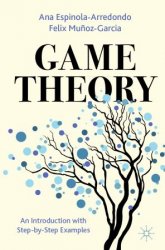 Название: Game Theory: An Introduction with Step-by-Step Examples Название: Game Theory: An Introduction with Step-by-Step Examples
Автор: Ana Espinola-Arredondo, Felix Muñoz-Garcia
Издательство: Palgrave Macmillan
Год: 2023
Страниц: 471
Язык: английский
Формат: pdf (true)
Размер: 13.0 MB
An introduction to game theory, complete with step-by-step tools and detailed examples.
This book offers condensed breakdowns of game-theory concepts. Specifically, this textbook provides “tools” or “recipes” to solve different classes of games.
Game Theory presents the information as plainly and clearly as possible. Every chapter begins with the main definitions and concepts before diving into the applications to different settings across economics, business, and other social sciences. Chapters walk readers through algebraic steps and simplifications. This makes the text accessible for undergraduate and Masters-level students in economics and finance. Paired with the exercises published on the accompanying website, students will improve both their theoretical and practical understandings of game theory.
Readers will walk away from this book understanding complete and incomplete information models as well as signaling games.
Chapter 1 defines Game Theory, presents the main ingredients in a game and its graphical representation, discusses the solution concepts that help us identify equilibrium behavior in a game, and how to assess these solution concepts according to different criteria.
Chapters 2–5 study simultaneous-move games of complete information. Specifically, Chapter 2 presents our first solution concept (dominance), where players rule out strategies that yield an unambiguously lower payoff regardless of what her opponent choose. We apply this solution concept to standard games, and study the notion of weakly dominated strategies and strictly dominant strategies.
In Chapters 6 and 7, we switch our attention to sequential-move games of complete information. In particular, Chapter 6 first shows that using the NE solution concept in this class of games may yield outcomes that are based on incredible beliefs. Then, it presents the subgame perfect equilibrium (SPE) solution concept, which identifies equilibria where players are “sequentially rational,” meaning that they maximize their payoffs at every section of the game tree when they are called to move. Chapter 7 continues our study of sequential-move games, but now allowing for games to be repeated, either finite or infinite times, and focusing on whether more cooperative outcomes can be sustained as a SPE than when the game is unrepeated.
Chapters 8 and 9 consider simultaneous-move games of complete information. In Chapter 8, we analyze the Bayesian Nash equilibrium (BNE) solution concept, and different tools to find BNEs in games where one or more players are privately informed. Chapter 9 applies this solution concept to auctions—a strategic setting where players are privately informed about their valuations for the object on sale. We examine different auction formats, such as the first-price, second-price, and common-value auctions, how to find equilibrium bids (the BNE of this game), and the seller’s expected revenue from each auction format.
Chapters 10–13 focus on sequential-move games of incomplete information. First, Chapter 10 presents the Perfect Bayesian Equilibrium (PBE) solution concept, and why using the BNE from Chapter 8 may lead to outcomes based on incredible beliefs.
Contents:
1. Introduction to Games and Their Representation
2. Equilibrium Dominance
3. Nash Equilibrium
4. Nash Equilibria in Games with Continuous Action Spaces
5. Mixed Strategy Nash Equilibrium
6. Subgame Perfect Equilibrium
7. Repeated Games
8. Bayesian Nash Equilibrium
9. Auction Theory
10. Perfect Bayesian Equilibrium
11. Equilibrium Refinements
12. Signaling Games with Continuous Messages
13. Cheap Talk Games
Скачать Game Theory: An Introduction with Step-by-Step Examples
|